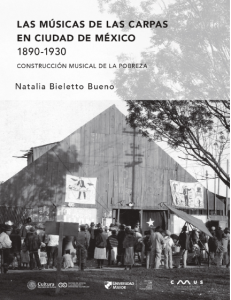Interview with Natalia Bieletto: “Everyone talks about tents and knows about them, but they’ve been very little researched.”
Due to various circumstances, Natalia Bieletto took a long time to finally publish The music of the tents in Mexico City: 1890-1930. The musical construction of poverty . Thanks to the time it took, the ideas matured further. The CMUS research associate originally wrote it in English, but when translating it, she had to be more direct in her communication strategies and significantly reduced the theoretical content to make it more accessible to the general public. The research required extensive travel between archives scattered across various countries, which is why she believes she was recognized with the IASPM award for best non-English language book on July 10 at the Recording Popular Music conference in Paris. ““I’m very happy to have received it, especially from a panel of peers who recognize the effort and virtues of this book,” says the author. “On a personal level, it’s a great satisfaction.”
Why is this award important within the academy?
There’s a recognition of academic work, which requires careful consideration. The time it took to complete it fell outside the expected rhythms of production. Since the book is in academic format, it’s more difficult to defend it before a journal or other publication with high ratings. So, for me, it’s important that there be recognition of the work and reflection required. Especially because there’s an awareness that it’s written in a way that seeks to connect with the reader without losing analytical depth.

How has the book’s publication been received in Mexico and Chile?
I’m still in the dissemination stage. In Mexico, we had a couple of outreach events. One of them was the presentation itself at the National Sound Archive, with a discussion with other popular culture specialists and a long media interview. The reception has been positive, especially because the topic generates a lot of interest in Mexico. Everyone talks about carp and knows about them, but they’ve been very little researched. So, in that sense, the text has been welcomed. The title La construcción musical de la pobreza (The musical construction of poverty), has been questioned, and I’ve received a lot of comments from people who haven’t read the book, questioning its name. “How is that possible?” and asking if I’m romanticizing poverty. So, once you delve into the argument, you begin to discover precisely why there’s talk of this construction of poverty and the social representations around the tents that helped shape a sense of social class. It’s a deconstructive method.
In Chile, we recently had an event at the National Library with other colleagues who are also working with 19th-century variety shows. We’re planning the launch of the book here, probably in collaboration with the Mexican Embassy, and soon an academic event at the University of Los Lagos. So we’ll see how it’s received. For now, well, I think this award also sparks interest among potential readers of this book, right?
What new research can the topic of your book lead to?
That’s precisely one of them, isn’t it? Stage and musical variety shows were common to many Latin American countries, but historiography has portrayed them as something closely tied to national identities and specific to each case. For example, Cuban zarzuela has been investigated as part of their cultural identity. The same goes for the Cuban circus and the poor circus of South America. So, the virtue of this book is that it allows for a transnational dialogue about how these variety shows functioned and how music permeated them. This happened at a highly pivotal moment in the early days of phonography, in the historical period between 1890 and 1930. This opens up the opportunity to examine their impact on the transformation of the music industry in each country and the entire region. You can see how these shows were replaced by live music, giving rise to the mass entertainment industry. There is, of course, a nod to neo-Marxism, to this idea of class struggle and who is represented by whom, a question that cuts across popular culture studies. This is what the book can offer as new opportunities for dialogue.


